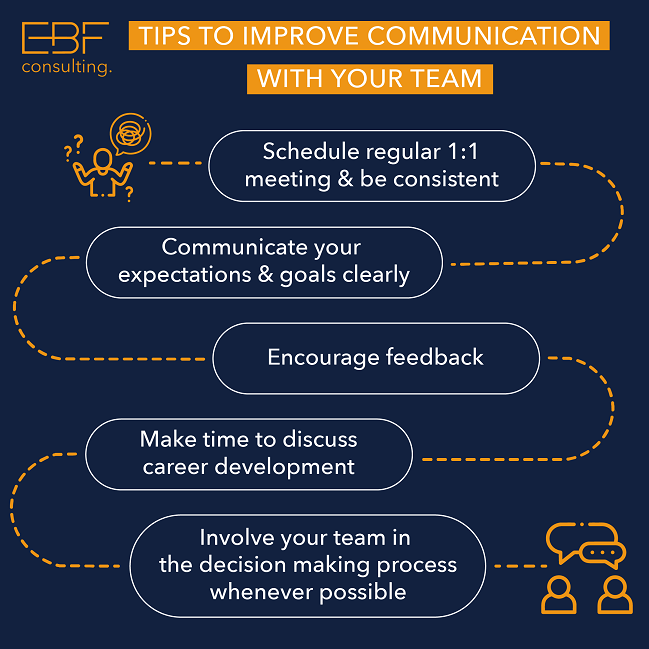Active listening and open communication help create a productive, enjoyable work environment where team members feel supported and motivated to work towards common goals. But in many cases, leaders don't have time for their team. That leads to my first point: make the time. Plan ahead, prioritize your tasks, disregard the unimportant, or delegate more. If you don't know your people and the issues they deal with, communication will always struggle. When employees feel that their perspective is not even being considered, they start to become less invested in the projects they're working on. As a result, they are less productive, become disengaged from their jobs, and eventually leave the company. Since I'm sure you don't want that, let's examine a few strategies for making communication a top priority.

Schedule regular 1:1 meetings & be consistent.
A 1:1 meeting is a unique opportunity to build a trusting relationship. Regular check-ins between two people allow both parties to get to know each other better, develop in their roles, and stay informed about daily activities. Instead of micromanaging during these meetings, use them as a chance to learn about the difficulties the person is dealing with, discuss goals, and offer help when it’s needed. This approach leads to improved employee experiences, motivation, and engagement. You will thrive as an outcome because the success of the manager is closely related to the performance of the team. Remember, good communicators are also good listeners. When you listen well, you gain a clear understanding of another person's perspective.
Weekly meetings are the best frequency for new hires and junior employees. Weekly contact can also help make up for a lack of unplanned face-to-face interaction if your team works remotely. Senior employees generally don't need consultation that often, but it’s advised to keep meetings once every 14 days; otherwise, it is difficult to maintain a relationship. Finally, try to avoid cancelling 1:1s if that isn't absolutely necessary. Frequent interruptions make employees feel that they are low on your priority list.
Communicate your expectations & goals clearly.
Clear communication is necessary to establish trust and avoid confusion at the same time. You can have the greatest idea in the world, but if you can’t persuade anyone else to follow your vision, your influence and impact will be greatly diminished. The first key element of success is being yourself. Authenticity counts — a lot. Be honest and sincere. Find your own voice; avoid using corporate speech or sounding like someone you're not. Your communication should reflect who you are, where you are from, and what you value. Authentic leadership is what people want, respect, and will stay committed to.
When you set goals, make sure that everyone understands them the same way. Illustrate your vision through stories, be direct, and ask questions like, "Who else is affected in this situation?" to ensure that key elements are taken into account. Don’t forget to mention the desired outcome, the timeframe, and resources, as well as any other important details.
Encourage feedback.
To enhance collaboration, productivity, and overall workplace effectiveness, feedback is an essential tool. Feedback can come in various forms, such as performance evaluations, 360-degree assessments, or informal messages from team members and colleagues. We often overlook the power of positive feedback and focus only on flaws. But when you ask employees what would drive them to create excellent work, a lot of them answer "receiving personal recognition". For praise to be effective, it needs to be specific and given sooner than later. If you notice someone doing a great job, express your appreciation.
On the other hand, there are situations when you
need to provide negative feedback. In such cases, criticism should be
constructive, objective, and actionable, so that explicit and measurable goals
can be set based on it. Always discuss a job poorly done, never the person as a
human being. And don’t be afraid to ask for feedback on yourself.
Make time to discuss career development.
According
to studies, lack of career advancement is one of the main reasons why workers
leave their jobs. You may never have a job position that fits the employee's
future plans, but it's important to talk about their desires and support their
growth. You can together create a career development plan, and to do that, it’s
necessary to make time for a discussion first. Many companies have this
interview as part of the employee’s annual evaluation. But I personally found it useful to talk with my team members about their plans in a less
formal way and more frequently. For example, invite your employees once in a
while to breakfast, lunch, or dinner. You may be surprised at what kind of
information you can take away from this type of meeting.
Involve your team in the decision-making process whenever possible.
If the team is involved in the decision-making process, you will find far less resistance when it comes to implementation. The colleagues are already familiar with the pros and cons; they‘ve discussed and debated various possible options. As a result, they can believe in the final decision and your leadership. By involving co-workers in decision-making, there is also a better chance that blind spots will be exposed during the process. The team can be involved in a variety of ways, from simple ones like expressing opinions in a questionnaire to more challenging ones like group brainstorming. But keep in mind that, as a leader, the final decision is on you. You are the person who is held accountable for the team’s actions and performance.
Excellent
leaders often say that intuition is what guides their decision-making. Most people might assume that strategic decisions should be based on empirical
evidence and that inner sense has little or no place in business. But there
is increasing evidence that intuition is more than merely a feeling. Many
scientists now believe that it is, in fact, the result of our brains piecing
together information and experiences to come to different, and less obvious
solutions and conclusions.
Therefore, my last piece of advice is simple. Leadership is a journey. Always stay true to yourself along the way, and trust your gut. Because only you know what feels right. Happy leading!


